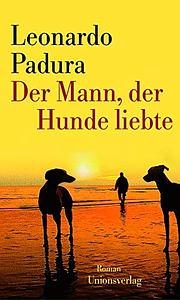Take a photo of a barcode or cover
emotional
informative
reflective
sad
Plot or Character Driven:
Character
Strong character development:
Yes
Loveable characters:
Complicated
Diverse cast of characters:
Yes
Flaws of characters a main focus:
Complicated
An intense summary of the titanic shift from the idyllic dream of a workers paradise ro the shattering nightmare of totalitarianism, through the life and death of Leon Trotsky. Brilliantly conceived and a very good book!!
There might be a good book in there but I could not get past the clunking translation. Gave up.
Seems a lot of the good reviews and high scores come from non-English translations?
Seems a lot of the good reviews and high scores come from non-English translations?
I had it sitting there for months because it is a 600 page book and therefore a big commitment and since i never leave books in the middle there is a risk that i get into a very painful reading of a boring long book for aaages. But this was definitely not the case. What a brilliant book. Definitely resonates with any revolutionary spirit. And in particular any young Marxist or communist. The journey of an idealist becoming disillusioned, realising that it is all a lie and that the people who preach the realisation of his dreams are only interested in their personal political gains. Then comes the denial, then fighting against the system of a "communist" party, realising that it is all corrupt and fake, trying to influence people from within, realising that they all don't really want to change anything but like the comfortable seat of enjoying their privileged position in a communist society while pretending that they are against it. And then comes the apathy and keeping ones ideology and belief in humankind private hoping that one day it will be different but in reality also not being willing to risk anything significant for that change. It really resonated with me. What an incredible journey.
"Matar a un hombre por defender una idea no es defender una idea, es matar a un hombre". Juan Goytisolo. Hace mucho no leía un libro tan bien escrito, una trama inteligente, que te hiciera cuestionar tanto...
“La verdadera grandeza humana está en la práctica de la bondad sin condiciones, en la capacidad de dar a los que nada tienen, pero no lo que nos sobra, sino una parte de lo poco que tenemos.”-Leonardo Padura Fuentes.
¡Qué gran libro! Llegué a éste título gracias a la recomendación de una gran persona, pilar de la Universidad en la que laboro; y tenía razón, es un libro que lo tiene todo. Al principio la obra parecería no tener ni pies ni cabeza, son muchos los lugares, personajes, hechos históricos y ficticios que puede percibirse como demasiado para llevar un hilo en la lectura. Pero, con paciencia y conforme va avanzando la historia, es una delicia. Está por demás mencionar la temática específica del libro (ya muchos reviews lo refieren), sólo me queda mencionar que el capítulo del asesinato de Liev Davídovich Bronstein es de 5 estrellas.
¡Qué gran libro! Llegué a éste título gracias a la recomendación de una gran persona, pilar de la Universidad en la que laboro; y tenía razón, es un libro que lo tiene todo. Al principio la obra parecería no tener ni pies ni cabeza, son muchos los lugares, personajes, hechos históricos y ficticios que puede percibirse como demasiado para llevar un hilo en la lectura. Pero, con paciencia y conforme va avanzando la historia, es una delicia. Está por demás mencionar la temática específica del libro (ya muchos reviews lo refieren), sólo me queda mencionar que el capítulo del asesinato de Liev Davídovich Bronstein es de 5 estrellas.
3,5 stars.
As a historical novel, it is well built and keeps you wanting to turn the pages. It has, nonetheless, some small 'problems'. In several occasions it insists on repeating the same ideas shared between the same characters in dialogs throughout the book, which becomes less and less easy to not notice as the story continues. It also stretches the story a bit more than necessary, in my opinion. Some of the parts about politics and the "real-world" situations are also a bit repetitive, even if context was a must for readers to follow the plot.
For me, personally, it was an enjoyable story to read, but there's this mix of historical novel and almost biography of Trotsky that just didn't stick with me. It left me wanting this to be a biography when reading those chapters, and at the same time wanting a different development for the whole story as the more fictional chapters were being laid out.
As a historical novel, it is well built and keeps you wanting to turn the pages. It has, nonetheless, some small 'problems'. In several occasions it insists on repeating the same ideas shared between the same characters in dialogs throughout the book, which becomes less and less easy to not notice as the story continues. It also stretches the story a bit more than necessary, in my opinion. Some of the parts about politics and the "real-world" situations are also a bit repetitive, even if context was a must for readers to follow the plot.
For me, personally, it was an enjoyable story to read, but there's this mix of historical novel and almost biography of Trotsky that just didn't stick with me. It left me wanting this to be a biography when reading those chapters, and at the same time wanting a different development for the whole story as the more fictional chapters were being laid out.
adventurous
dark
emotional
informative
reflective
medium-paced
Una novela absorbente que nos cuenta la historia de dos figuras unidas por la ideología, la tragedia y, tal vez, el destino. Trata de Trotski, uno de los revolucionarios de octubre que luchó junto a Lenin y luego fue apartado, vilipendiado, exiliado y perseguido hasta la muerte por Stalin; y de Ramón Mercader, un luchador comunista en la guerra civil que fue reclutado por los soviéticos como espía y que terminaría por asesinar a Trotski. También nos cuenta la vida de Iván, un cubano, veterinario y escritor desengañado, que funciona como nexo de unión entre estas dos vidas, y que representa, tal vez, el desengaño en que desembocó la revolución comunista.
Leonardo Padura lleva a cabo la tarea de contar todo esto con desenvoltura. Es obvio que hay partes de la historia, sobre todo concernientes a Mercader, que es imposible que él conozca, pero consigue darles verosimilitud, que te las creas, demostrando así un gran talento como fabulador. Además, mezcla en una narración eminentemente psicológica, trazas de una historia de espias, puesto que eso es al final lo que fue. Es una novela pausada, que no lenta, que se toma su tiempo en desarrollar los personajes y acontecimientos, pero es un ritmo necesario, dado la cantidad de nombres y cosas que ocurren, que podrían dar lugar a confusión en un ritmo más acelerado.
Al final, lo que trata de conseguir es trazar un retrato total (o casi) de una de las ideologías que marcaron el siglo veinte, con sus sombras, con sus contradicciones, con sus profundas disensiones. Si se tiene curiosidad por esta parte de la historia y/o quiere uno principiar en la historia del comunismo, y más concretamente el estalinismo, es un libro recomendable.
Leonardo Padura lleva a cabo la tarea de contar todo esto con desenvoltura. Es obvio que hay partes de la historia, sobre todo concernientes a Mercader, que es imposible que él conozca, pero consigue darles verosimilitud, que te las creas, demostrando así un gran talento como fabulador. Además, mezcla en una narración eminentemente psicológica, trazas de una historia de espias, puesto que eso es al final lo que fue. Es una novela pausada, que no lenta, que se toma su tiempo en desarrollar los personajes y acontecimientos, pero es un ritmo necesario, dado la cantidad de nombres y cosas que ocurren, que podrían dar lugar a confusión en un ritmo más acelerado.
Al final, lo que trata de conseguir es trazar un retrato total (o casi) de una de las ideologías que marcaron el siglo veinte, con sus sombras, con sus contradicciones, con sus profundas disensiones. Si se tiene curiosidad por esta parte de la historia y/o quiere uno principiar en la historia del comunismo, y más concretamente el estalinismo, es un libro recomendable.
In my reading life I have read other writers that have worked under the heavy palm of Soviet Communism, the masterpieces of Milan Kundera from then still intact Czechoslovakia, the incandescent Master and Margarita from Bulgakov in the Soviet Union, the flawed but heartbreaking Before the Night Falls by Cuban Reinaldo Arenas, and the stentorian but irrepressible Solzhenitsyn in his terrifying Gulag Archipelago, all works written in clandestine, reckless defiance of the diktadura and its ideological strictures on the purposes of literature. While Bulgakov would in the fashion of Soviet repression be crushed and slowly killed the other two would flee into exile. Arenas after fleeing with the Marielitos to Miami would succumb to depression.
I have never read a book by someone who not only wrote while living in a country where fear and mind control are guiding principles but voluntarily has chosen to remain living there. Until now. And it is a memorable book.
All these years after the fall of the Berlin Wall, I would, if I had given the matter any thought, never have guessed I would come across such a book, written in 2009, in a Cuba whose Socialist experiment has been teetering on the edge of ruin practically since it's inception, by 62-year old Leonardo Padura, who signs off at the end of the novel, "always in Mantilla, Cuba, 2009."
Suffice it to say that for the 2 weeks that it took me to devour this 722-page novel I was obsessed with its parallel stories of the eventually to be assassinated exile Leon Trotsky, the Spaniard who would commit the deed, and the Cuban writer who while on a Havana beach in 1972 is bewitched by the sight of a man walking his two Borzoi dogs.
I have never read a book by someone who not only wrote while living in a country where fear and mind control are guiding principles but voluntarily has chosen to remain living there. Until now. And it is a memorable book.
All these years after the fall of the Berlin Wall, I would, if I had given the matter any thought, never have guessed I would come across such a book, written in 2009, in a Cuba whose Socialist experiment has been teetering on the edge of ruin practically since it's inception, by 62-year old Leonardo Padura, who signs off at the end of the novel, "always in Mantilla, Cuba, 2009."
Suffice it to say that for the 2 weeks that it took me to devour this 722-page novel I was obsessed with its parallel stories of the eventually to be assassinated exile Leon Trotsky, the Spaniard who would commit the deed, and the Cuban writer who while on a Havana beach in 1972 is bewitched by the sight of a man walking his two Borzoi dogs.



